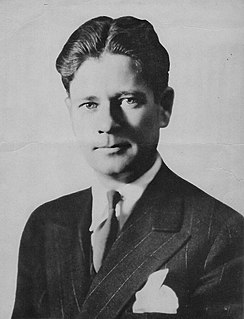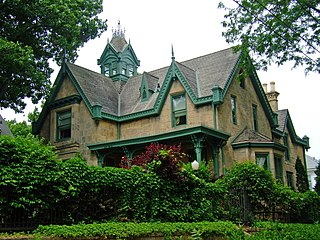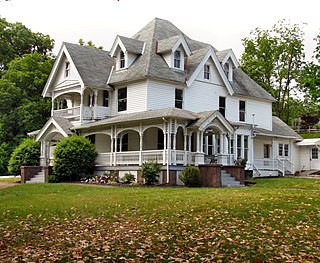
Robert Marion "Fighting Bob" La Follette Sr., was an American lawyer and politician. He represented Wisconsin in both chambers of Congress and served as the 20th Governor of Wisconsin. A Republican for most of his life, he ran for president of the United States as the nominee of his own Progressive Party in the 1924 presidential election. Historian John D. Buenker describes La Follette as "the most celebrated figure in Wisconsin history".

Robert Marion "Young Bob" La Follette Jr. was an American politician serving as a U.S. Senator from Wisconsin from 1925 to 1947. A member of the La Follette family, he was a son of U.S. Representative, U.S. Senator and Wisconsin Governor Robert M. La Follette Sr., and father of Wisconsin Attorney General Bronson La Follette. As co-founder of the Progressive Party and ally of the Farmer-Labor Party in adjacent Minnesota, La Follette kept the Progressive Party alive in the US Senate until his defeat by Joseph McCarthy in 1946.
Robert La Follette may refer to:

The Wisconsin Idea is a public philosophy that has influenced policy and ideals in the U.S. state of Wisconsin's education system and politics. In education, emphasis is often placed on how the Idea articulates education's role for Wisconsin's government and inhabitants. In politics, the Idea is most associated with the historic political upheaval and subsequent reformation during the Progressive Era in the United States.

Philip Fox La Follette was an American politician. He was the 27th and 29th Governor of Wisconsin, as well as one of the founders of the Wisconsin Progressive Party.

Isabelle Case La Follette, known as Belle Case, was a women's suffrage, peace, and civil rights activist in Wisconsin, United States. She worked with the Woman's Peace Party during World War I. At the time of her death in 1931, The New York Times called her "probably the least known yet most influential of all American women who have had to do with public affairs in this country." She was the wife and helpmate of Robert "Fighting Bob" La Follette—a prominent Progressive Republican politician both in Wisconsin and on the national scene—and as co-editor with her husband of La Follette's Weekly Magazine.

Isaac Stephenson was an American politician of the Republican Party who represented Wisconsin as both a United States representative and a United States senator.
The Progressive Party was a political party created as a vehicle for Robert M. La Follette, Sr. to run for president in the 1924 election. It did not run candidates for other offices, and it disappeared after the election. The party advocated progressive positions such as government ownership of railroads and electric utilities, cheap credit for farmers, the outlawing of child labor, stronger laws to help labor unions, more protection of civil liberties, an end to American imperialism in Latin America, and a referendum before any president could lead the nation into war.

The Republican Party of Wisconsin is a right-wing political party in Wisconsin and is the Wisconsin affiliate of the United States Republican Party (GOP). The state party chair is Paul Farrow. The state party is divided into 72 county parties for each of the state's counties, as well as organizations for the state's eight congressional districts.

Nils Pederson Haugen was a Norwegian American immigrant, lawyer, and politician. He served four terms in the United States House of Representatives, representing western Wisconsin. He was a leading member of the Progressive Movement in Wisconsin and a national expert on tax reform. The village of Haugen, Wisconsin, in Barron County, was named after him.

The La Follette family is a prominent family in the United States, especially in Wisconsin. Many of the family members have pursued political office.

The 1924 United States presidential election in California took place on November 4, 1924 as part of the 1924 United States presidential election. State voters chose 13 electors, or representatives to the Electoral College, who voted for president and vice president.

Flora Dodge "Fola" La Follette was a women's suffrage and labor activist from Madison, Wisconsin, United States. At the time of her death in 1970, The New York Times quoted her on women's suffrage: "A good husband is not a substitute for the ballot." She was the daughter of progressive politician Robert "Fighting Bob" La Follette and lawyer and women's suffrage leader Belle Case, wife of playwright George Middleton, a contributing editor to La Follette’s Weekly Magazine, an actress, and, with her mother, a chronicler of her father's life.

The Richard T. Ely House is a Georgian Revival-style house built in 1896 in Madison, Wisconsin - designed by Charles Sumner Frost for Richard T. Ely, a prominent economics professor. In 1974 it was added to the National Register of Historic Places. It is located within the University Heights Historic District.

The William T. Leitch House is a well-preserved house built in 1857 a half mile northeast of the capitol square in Madison, Wisconsin. In 1975 it was added to the National Register of Historic Places, as "the best example of mid-19th century Gothic Revival style" in Madison, and for its association with the city mayors and legislator who lived there.

The 1924 United States presidential election in Wisconsin was held on November 4, 1924 as part of the 1924 United States presidential election. State voters chose 13 electors to the Electoral College, who voted for president and vice president.

The 1924 United States presidential election in Minnesota took place on November 4, 1924, in Minnesota as part of the 1924 United States presidential election. Voters chose 12 electors, or representatives to the Electoral College, who voted for president and vice president.

The LaFollette House is an historic house in LaFollette, Tennessee, U.S.A.. It was built in the 1890s for Harvey Marion LaFollette, the owner of the LaFollette Coal and Iron Company. LaFollette also built the North Tennessee Railroad. His brother Grant lived in the house until he sold it to the Russell family in 1930. It sold to the Rogers family and still later to the Stone family. In September 2020 the home sold to the current residents.

The 1924 United States presidential election in North Dakota took place on November 4, 1924, as part of the 1924 United States presidential election which was held throughout all contemporary 48 states. Voters chose five representatives, or electors to the Electoral College, who voted for president and vice president.

The 1924 United States presidential election in Kansas was held on November 4, 1924 as part of the 1924 United States presidential election. State voters chose ten electors to the Electoral College, who voted for president and vice president.





















